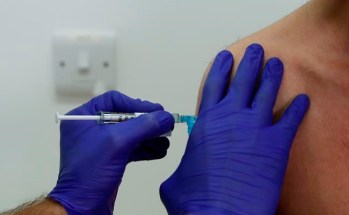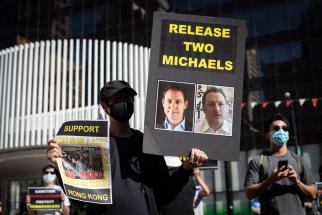Consequences of non-vaccination require clarity
Read this article for free:
or
Already have an account? Log in here »
To continue reading, please subscribe:
Monthly Digital Subscription
$0 for the first 4 weeks*
- Enjoy unlimited reading on winnipegfreepress.com
- Read the E-Edition, our digital replica newspaper
- Access News Break, our award-winning app
- Play interactive puzzles
*No charge for 4 weeks then price increases to the regular rate of $19.00 plus GST every four weeks. Offer available to new and qualified returning subscribers only. Cancel any time.
Monthly Digital Subscription
$4.75/week*
- Enjoy unlimited reading on winnipegfreepress.com
- Read the E-Edition, our digital replica newspaper
- Access News Break, our award-winning app
- Play interactive puzzles
*Billed as $19 plus GST every four weeks. Cancel any time.
To continue reading, please subscribe:
Add Free Press access to your Brandon Sun subscription for only an additional
$1 for the first 4 weeks*
*Your next subscription payment will increase by $1.00 and you will be charged $16.99 plus GST for four weeks. After four weeks, your payment will increase to $23.99 plus GST every four weeks.
Read unlimited articles for free today:
or
Already have an account? Log in here »
Hey there, time traveller!
This article was published 14/06/2021 (1641 days ago), so information in it may no longer be current.
For those who are dead-set against getting vaccinated against COVID-19, there are a couple of things you should know.
While it is your legal right to refuse a COVID-19 vaccine, that does not give you additional unfettered rights to go anywhere, do anything, with anyone at anytime. In fact, those who don’t get vaccinated may find they are subject to prolonged social and economic restrictions that will, in all likelihood, be very legal and very enforceable.
The bigger question here is why more people don’t know that and, closely related to the first, why governments are not doing more to clarify the consequences of non-vaccination.
While countries like the United States have generated volumes of information on the legal issues surrounding COVID-19 vaccines, both federal and provincial governments in this country have been eerily silent at a time when we really need clarity. That is particularly infuriating because Canada already has a legal framework that governs the limits that can be legally imposed on our guaranteed rights and freedoms.
Arthur Schafer, a bioethicist at the University of Manitoba, says a landmark 1986 Supreme Court decision established what has become known as the “Oakes Test,” which lays out the conditions that must be met to justify any intrusion on individual rights or freedoms.
The Oakes Test asks whether the threat “pressing and substantial,” that the goal of the intrusion cannot be accomplished by other means, that there is a strong likelihood the intrusion will achieve its goal, and that it is proportional to the gravity of the threat.
“In other words, they’re asking whether the benefits outweigh the harm done by limiting someone’s rights and freedoms,” Schafer said.
One need only look at the social and economic consequences of the pandemic to know that COVID-19 is both pressing and substantial. Further, almost everyone except the hardcore anti-vaxxers accept that vaccines are our only realistic hope of escaping the pandemic. And finally, that there is a very real possibility of an “endless pandemic” if strong measures are not used to stamp out the novel coronavirus.However, where Sharma veers dangerously off course is suggesting the passport itself is discriminatory; the real issue is access to vaccines, not whether it is legal to ask for proof of vaccination.
Although governments have been silent, private law firms and legal scholars have weighed in and the consensus is that since vaccines are widely available and free, an employer could make proof of vaccination a condition of employment for a new hire. And if a particular workplace requires employees to be vaccinated to ensure the safety of co-workers or others, it is not discriminatory to ask for proof of vaccination.
There are caveats. Schafer noted that “reasonable accommodations” must be made to the point of “undue hardship.” These could include offering non-vaccinated people roles where they don’t come in contact with other people, or are provided separate work spaces or continued opportunities to work from home. Or, employers could ask someone who cannot or will not be vaccinated to undergo regular COVID-19 testing and provide proof of the test results.
“It’s important to sort out the issues here,” Schafer said. “We’re not talking about mandatory vaccinations. We’re talking about mandatory proof of vaccination, and that is a much different thing. If you tick all the boxes (on the Oakes test), these restrictions should hold up.”
There will be those who will disagree.
Last week, Karen Sharma, acting executive director of the Manitoba Human Rights Commission, warned the province and private businesses that vaccine passports would likely be classified as discriminatory under provincial law because it is not easily obtained by some people in the province. And for the most part, she is right.
Those with no fixed address, who struggle with language barriers, physical limitations or a lack of economic means have always had trouble getting government identification. We have to create a mechanism to fully recognize those people who genuinely cannot be vaccinated for medical reasons.
However, where Sharma veers dangerously off course is suggesting the passport itself is discriminatory; the real issue is access to vaccines, not whether it is legal to ask for proof of vaccination.Left out of these statements is an acknowledgement that every time you renew your driver’s licence, you are asked for an update on the quality of your eyesight. When you register children for public school, you must disclose if they have received vaccinations or provide a valid reason for an exemption. Insurance companies almost always require a medical examination in order to get a life insurance policy.
Sharma is not alone in muddying the waters on this issue. Earlier this year, federal and provincial privacy commissioners and ombuds declared vaccine passports as “an encroachment on civil liberties that should only be taken after careful consideration.”
Left out of these statements is an acknowledgement that every time you renew your driver’s licence, you are asked for an update on the quality of your eyesight. When you register children for public school, you must disclose if they have received vaccinations or provide a valid reason for an exemption. Insurance companies almost always require a medical examination in order to get a life insurance policy.
Two-dimensional analyses erroneously suggest there are no consequences for refusing to get vaccinated. They may be saying, “be careful,” but what many Canadians hear is “vaccine passports are illegal and discriminatory.”
COVID-19 represents the single greatest threat to public health and economic security in the history of this country. Given the gravity of that threat, and the nature of both the virus and the vaccines, we need to do everything we can to vaccinate every willing Canadian.
And those who choose not to be vaccinated? They will ultimately reap the benefits of the efforts made by the vaccine willing. It just may take a wee bit longer than they expected.
dan.lett@freepress.mb.ca

Born and raised in and around Toronto, Dan Lett came to Winnipeg in 1986, less than a year out of journalism school with a lifelong dream to be a newspaper reporter.
Our newsroom depends on a growing audience of readers to power our journalism. If you are not a paid reader, please consider becoming a subscriber.
Our newsroom depends on its audience of readers to power our journalism. Thank you for your support.

.jpg?h=215)






